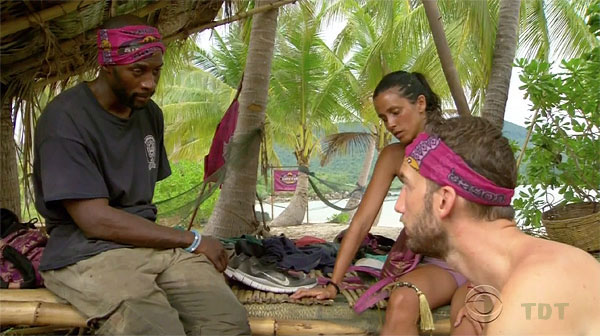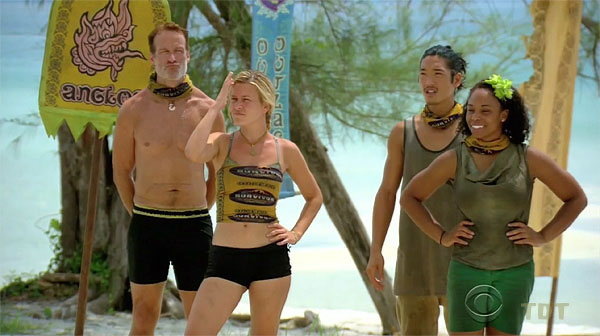

Before we begin this recap, we must take a moment to mourn the loss of my winner pick. Poor Monica, she didn’t speak for 600 straight episodes and then became a chatterbox at the beginning of this one.
I knew right away I did not predict the Survivor: Cambodia winner. I cried. Or not.
But enough with all that. I think I overestimated Monica’s game, she didn’t add anything so far this season and her vote-off will, honestly, only strengthen the season.
So let’s talk some theory.
Two weeks ago, Andy Baker, right on this here site, discussed the idea of “ego” and how it affected each player’s strategy. What Andy masterfully kind of explored is the way ethics always seem to play a large part in Survivor.
One of the main reasons I’ve loved this show for 30 seasons comes from the way I feel it really gets at the heart of the human condition better than any other reality program. Castaways ditch their real lives and all the creature comforts, relationships and responsibilities that come with those, and kind of have to amass new versions of all those things. Because those are kind of the essence of being a human.
Each season, when castaways try to find their footing in the game, we see them basically create a worldview for themselves, a manner in which they view the rules of the game and how to play it.
In mass communication research, especially journalism, we utilize various ethical theories constantly. It shouldn’t come as surprise that scholars look at journalism and ethics together, especially now, what with so many clear-cut issues and ethical lapses with heavy consequences or “news” networks or organizations aiming to distort reality all in the name of the almighty buck.
In Survivor, we constantly see contestants utilize ethical theories, even if they don’t know that’s what they’re doing. And it’s always different. In the game, I think most of us would agree that as long as you’re not breaking set rules, you’re playing ethically. But we know contestants don’t always feel that way.
We’ve seen players like Boston Rob in All-Stars and Russell Hantz in Samoa inarguably play great games, only to lose because jury members found their style of gameplay unethical. Or we’ve seen someone like Todd in China basically admit to playing the same type of game and get celebrated for it (partially because Amanda couldn’t speak at final tribal and partially because Todd made good relationships unlike like, say, Russell). But even think of a player like Sash in Nicaragua (or forget that season ever happened). Plenty of players just considered him completely unethical for many reasons never shown.
In the end, as Andy noted, everyone just wants to win. But contestants are judged based on how they play. And those judgments come from other contestants’ ethical viewpoints. No rules are broken, but ethics come into play. We see this in real life all the time. Think about politics. So much of the polarization in this country right now comes down to the ethical principles some people have versus what others think. Do we have a responsibility to others? Questions like that are always determined by an ethical philosophy … even if it’s not articulated.

And that’s what we saw last night at Bayon with Monica and Kimmi. Think about it: Monica showed trust in Kimmi by mentioning the possibility of an all-women alliance. She gave Kimmi more options. A rational player may not have agreed with Monica, but also wouldn’t have pushed her to be voted off since she was clearly an ally. Why would Kimmi want to boot someone she could clearly trust (even if she disagreed with her strategy)?
This is where ethics comes in. Kimmi is clearly playing the game, right now, with a utilitarian outlook. This is a theory from the 19th century ethicist Jeremy Bentham (most ethics theories are old and come from folks like Aristotle). Basically, the idea behind utilitarianism concerns the consequences of our actions. Someone who believes in this paradigm thinks that decisions should be made for the best of the whole. So if I subscribe to utilitarian beliefs, I want to make sure every decision I make is the one that results in the most positive outcome for the most amount of people.
Kimmi clearly illustrates utilitarian principles here. Even though keeping Monica might be best for Kimmi, she sees her alliance of Bayon as more important than just her singularly. She wants to do what’s best for the tribe and not just her. Now, you can argue that ditching Monica is good for Kimmi’s game, but I’m not sure I buy that at all. Kimmi did what’s best for the tribe. We’ve seen others play this way this season. Just think about Savage’s, um, savage attack on Stephen. He basically called Stephen a horrible waste of a human being because Stephen did something in the best interest of himself.
The irony in all of this is, of course, everyone on Survivor wants to win. Well, except all those non-Brian people who played in Thailand. But, again, we all rationalize our behavior somehow. Nobody wants to feel bad about choices, so we rationalize bad ones. But then some people just think more openly about themselves.
And that brings us to Monica. She clearly displayed principles of the theory of ethical egoism, again, a theory introduced by a 19th century philosopher, in this case, Henry Sidgwick. This theory basically states that we should do things in our own self interest. Now, there are many different ethical theories that deal with how people act in their own self interest. Some say it’s the only thing people can do; some say it’s the rational thing to do. Ethical egoism states that someone should not sacrifice their own self interest for the good of the group. And that’s Monica in this situation.

She could have gone along with the plan of ditching Kelly, because clearly that was the group’s consensus. But she believed that this move would hurt her. So she went to Kimmi. Unfortunately, Kimmi had more of a group mindset, one based on principles of utilitarianism, and that meant bye, bye Monica and bye, bye Pat’s winner pick.
Again, we see this all the time in Survivor. How often are people booted because the way they play the game differs from how others think they should? Or how someone will be admonished at final tribal for having the gall to try and win without breaking the rules. Or people will yell at Dreamz for, in a way, outsmarting Yau-Man when that same decision would be celebrated in a game of, say, poker. Even though very few people explicitly talk about ethical theories, that’s really what they’re getting at: “You have different ethical philosophies than I do.”
OK, no more getting ethical. Let’s get to some thoughts on the remaining players:
Ta Keo

- 1. Terry — Poor Terry. He likes to swim and catch fish and show off his physicality. And all this does is allow the other Ta Keo five to align without him. The edit leads me to believe Terry can’t win this game. I kind of hope I’m wrong. Him winning would be the same, sort of, as a less homophobic and just a more pleasant and physical version of Rudy winning.
- 2. Kelley — Kelley is still getting a winner’s edit, in my opinion. She’s not talking nearly as much, but she’s never ignored in an episode. I still have this feeling we’re going to see a new school alliance that takes out the alpha males at some point. And Kelley still has that idol. I was about to write something like that could make Kelley a winner, winner chicken dinner. But then I realized that would make me hungry. But I still wrote it, sort of. Oh, poop.
- 3. Joe — I kind of love how Joe believes his amazing new display of strategy literally consists of telling people they’re in an alliance with him. Basically, Joe think he’s playing better this time around even though he’s playing the exact same way, except this time he’s explicitly telling folks to be in alliance with him. Yeah, when the merge happens, good luck with that, Joe.
- 4. Ciera — I think Ciera is the person who once voted out her mom. If I remember, her mom played on a season with Russell. And Ciera didn’t play that season. She played a different one. And she voted off her mom in that different one. Her mom’s not on this season, and I haven’t seen Ciera once, so I don’t know who she’s going to vote off. Do you?
- 5. Kass — You know, I’ve kind of always thought of self-help books as pointless. Like, if you want to make some changes, you do it; the book is really just a conduit of sorts. I might have to reconsider my thoughts on this one since, as far as we can tell, Kass is doing a heck of a job winning friends and influencing people. Or she just hasn’t gone to tribal yet. Bring back Chaos Kass, by the way. I feel totally robbed of a vote.
- 6. Keith — I finally figured out what Keith must do all day when he ain’t fighting them fires: He spits, of course. Keith does a lot of spitting. And he plays with balls. Nobody is better with balls than Keith. He’s like the Ozzy of ball challenges. So, yeah, I imagine Keith sits in his garage playing with balls and spitting. And he just spit again.
Bayon

- 1. Spencer — Oh, man, do you think producers might, at some point, stop beating us over the damn head with an oak tree concerning Spencer and changing? I mean, we get it. I could have figured this out when I was 3. Producers have turned Spencer’s game into the equivalent of a children’s book that insults the intelligence of a, um, child.
- 2. Jeremy — My fellow Boston native had another great episode. He’s really making moves while still keeping himself vaguely shielded as a threat. Now, there is one problem. He’s now in an alliance with Kimmi, Stephen and Spencer. When the merge happens, do you think Savage will turn his back on Jeremy for aligning with weaklings? With people who clearly have no dignity? Savage is not going to be happy. Only macho men (and Tasha) allowed.
- 3. Stephen — That challenge gaffe made me laugh out loud, literally. It made my night. But Stephen also, finally, received some intelligent confessionals that pretty consistently showed his analytical side off. I feel like, again, Stephen’s edit, while still mocking, is getting better. Redemption. And if we know anything about the theme of this season …
- 4. Kimmi — You can take the girl out of Lawng Island, but you can’t take Lawng Island out the girl. Finally, Kimmi Kappenberg and her glorious accent returned to Survivor. I heard a rumor she was going to be on Cambodia, but I really couldn’t confirm it till this week. And, heck, she even became a catalyst for a vote off. This is classic Kimmi with a new twist.
- 5. Kelly — I choose to remember Kelly as the victim of a truly historical reality television moment that came just before a great contestant from little Rhode Island took the title of Sole Survivor for the first time. I refuse to remember Kelly as this epitome of horrid television. I mean, you always hear people complain (and I’ve done it) about how producers of all reality cast these ridiculous, over-the-top personalities and not regular people. If you ever complain about that again, shame on you. Remember Wigglesworth! Quite possibly the worst television I’ve ever witnessed.
Angkor

- 1. Abi-Maria — Man, I kind of want to talk about how my body’s a little sore right now since I ran seven miles this morning. But I feel like Abi might come through my television and tell me how she walked from the bedroom to the kitchen to get coffee this morning. So I have no right to talk about how sore I am. And how dare I try to garner any sympathy from readers. Abi knows lots of people who have run seven miles and died from it. On the bright side. If Angkor loses next week, Abi’s history … until the next Heroes vs. Villains season.
- 2. Woo —Maybe it’s because I live here in Colorado, but the image of Woo smoking up at home, getting to a horrible children’s establishment in Chuck E. Cheese, eating cardboard pizza, playing skee-ball and capping the night off with a leisurely swim through the ball pit immediately entered my mind on Wednesday. Man, thank goodness for small miracles. It made my week.
- 3. Tasha — I don’t think Tasha will win this season, but if they do another one of those America’s favorite player or whatever and give a non-winner some cash, Tasha deserves it. I mean, I think she’s doing even better job than Pete did of dealing with Abi. Could anyone of us do what Tasha’s doing without drowning Abi and her alien tendon in the ocean? Doubt it.
- 4. Andrew — Savage currently doesn’t have a shelter. He doesn’t have food. He just got a tarp, but doesn’t know what to really do with it yet. He doesn’t have his model/lawyer wife with him. He doesn’t have some horrible human like Stephen to talk about at the moment. Man, I hope his luxury item is that stack of Playboys.
Let’s do this again next week, ok? We’ll talk theory and I won’t cry about Monica going home.
 Pat Ferrucci started watching Survivor when episode two of Borneo first aired. He’s seen every episode since. Besides recapping here, he’ll be live-tweeting this season from the Mountain Time Zone. Why? Because nobody cares about the Mountain Time Zone except when they want to ski. Follow him @patferrucci for Survivor stuff and tweets about anything and everything that enters his feeble mind.
Pat Ferrucci started watching Survivor when episode two of Borneo first aired. He’s seen every episode since. Besides recapping here, he’ll be live-tweeting this season from the Mountain Time Zone. Why? Because nobody cares about the Mountain Time Zone except when they want to ski. Follow him @patferrucci for Survivor stuff and tweets about anything and everything that enters his feeble mind.
- Index of articles
- Pre-season preview
- Ep.1: Vytas, SIT down
- Ep.2: Varner teaches the Old School
- Ep.3: Tasha sets the Tribal agenda
- Ep.4: Abi continues cultivating an irrational gameplan
- Ep.5: Let's get ethical
- Ep.6: Follow the leader... or not
- Ep.7: Framing how it all went down
- Ep.8: Second Chance primed for an incredible end game
- Ep.9: Did Stephen just open or close the gate to winning?
- Eps.10-11: Construction junction, how do you function?
- Ep.12: Spiraling toward what could be an amazing end
- Ep.13: Planning behavior before the finale
- Ep.14: Wrapping up a stellar season